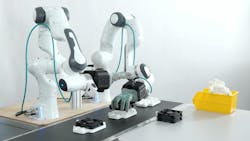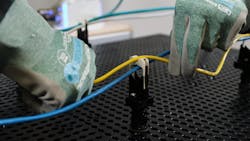Mimic secures millions in funding for robotic hand technology to pilot in plants
What you'll learn:
- A Swedish startup has secured over $20 million for its dexterous robotic hand tech that it will pilot with manufacturers, in warehouses and in logistics facilities.
- The technology already is being deployed with automative brands.
- The investment is part of a larger trend of European companies in the deployment of physical AI and humanoid technology.
A Swiss company, Mimic Robotics, has secured $16 million in seed funding to accelerate the development of breakthrough AI robotic hand technology that the firm will pilot with manufacturing companies and in warehouses and logistics facilities.
The seed investments will fund a pilot program of dexterous “physical AI” technology for robotic hands in manufacturing and logistics as the company aims to make "dexterity robotics" accessible across industries.
See also: Major robotics companies use NVIDIA technology to develop automated systems
Mimic announced in a Nov. 3 release that it had acquired the $16 million in the seed round, led by companies Elaia and Speedinvest, in addition to funding from other investors—Founderful, 1st kind, 10X Founders, 2100 Ventures and Sequoia Scout Fund—that brought total investments to more than $20 million.
The Swiss startup, founded last year as a spin-off from ETH Zurich, is led by a team of 25 engineers, researchers and operators. Mimic builds frontier physical AI models trained on real-world human demonstrations.
“Our approach pairs AI-driven dexterous robotic hands with proven, off-the-shelf robot arms to deliver the same capabilities in a way that is much simpler, more reliable and rapidly deployable,” Stephan-Daniel Gravert, co-founder and chief product officer at Mimic, said in the release.
Building humanoid robots has mainly drawn investments from companies in the U.S. and China, although real-world deployment often is slowed by regulatory concerns, safety issues and high costs, according to the release. Mimic's investment is part of a larger trend of European companies in the deployment of physical AI and humanoid technology.
See also: Way out of the talent shortage: AI as a catalyst for a workforce surge
Mimic trained the technology by collecting data from operators on factory floors, using demonstrations to train AI models with imitation learning, enabling Mimic’s humanoid robotic hands to reliably reproduce human technique.
The physical AI models ensure that robots autonomously react to changing positions and orientations of objects, handle disturbances and self-correct their actions, seamlessly operating in environments designed for humans, according to the release.
The robotic hands aren’t reliant on a full humanoid body to carry out tasks, as Mimic buys off-the-shelf robotic arms to fit to its hands.
The seed investments will fund a pilot program of dexterous “physical AI” technology for robotic hands in manufacturing and logistics.
The technology already is deployed with manufacturers, including Fortune 500 companies and automotive brands, working on pilot projects with European manufacturing and automotive companies that are testing its technology on assembly lines and in packaging operations.
Mimic also is partnering with logistics providers and is seeing demand within labor-intensive sectors and is testing packaging and sorting with logistics and retail customers.
See also: Manufacturers cite widespread labor shortages, use of automation and AI to help
The seed funding comes as labor shortages persist, and more companies look to reshore production in the midst of the U.S. tariff economy.
Analysts project the global humanoid and dexterous robotics market alone could reach $38 billion by 2035, within a broader robotics market estimated between $200 billion and $1 trillion by 2040.
Mimic is deploying its technology in the same market as Tesla’s, as Tesla CEO Elon Musk recently highlighted the complexities of designing the dexterous hands of his company’s general purpose robotic humanoid Optimus, which is under development.
About the Author
Sarah Mattalian
Staff Writer
Sarah Mattalian is a Chicago-based journalist writing for Smart Industry and Automation World, two brands of Endeavor Business Media, covering industry trends and manufacturing technology. In 2025, she graduated with a master's degree in journalism from Northwestern University's Medill School of Journalism, specializing in health, environment and science reporting. She does freelance work as well, covering public health and the environment in Chicagoland and in the Midwest. Her work has appeared in Inside Climate News, Inside Washington Publishers, NBC4 in Washington, D.C., The Durango Herald and North Jersey Daily News. She has a translation certificate in Spanish.


